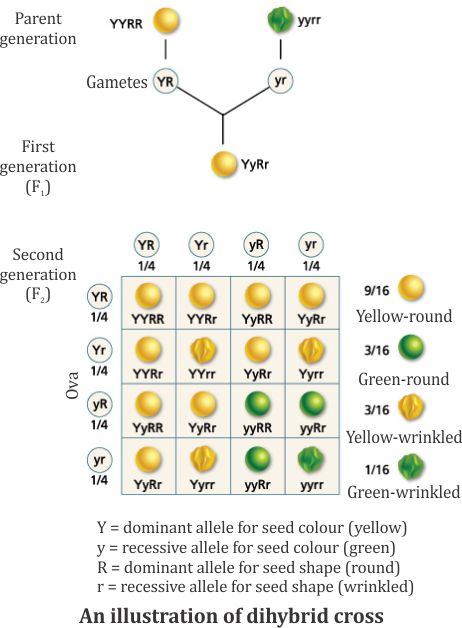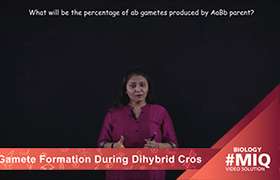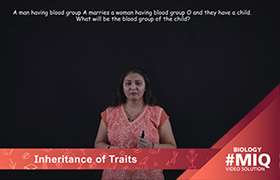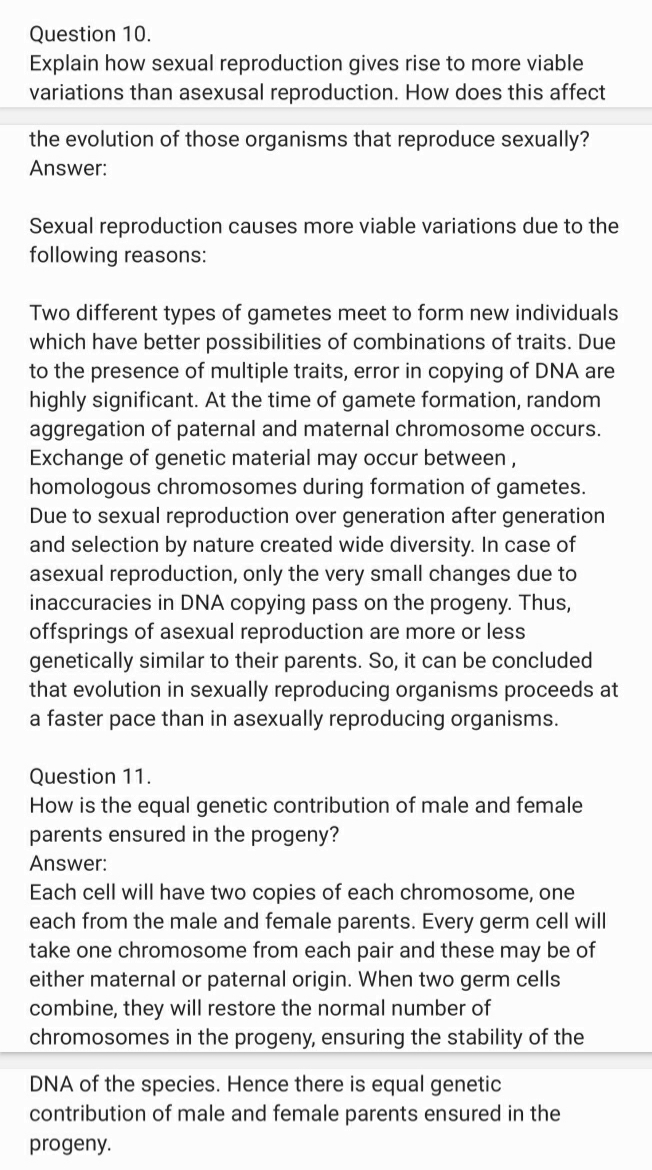CBSE Class 10 Answered
explain dihybrid cross?
Asked by Dolly | 04 Feb, 2015, 07:21: PM
- A cross that involves plants with two pairs of contrasting characters is called a dihybrid cross.
- Consider a cross of pea plants having round and yellow seeds and plants with wrinkled and green seeds. In this cross, the two pairs of characters involved are seed shape and seed colour.
- The letter capital R is used to denote round shaped seeds and capital Y to denote yellow coloured seeds. The genotype of parent plant is RRYY. The other parent has wrinkled seeds which are green in colour. The letter small r denotes wrinkled seeds and small y denotes green coloured seeds. The genotype of the parent is rryy. The two parent plants are then crossed, RRYY × rryy.
- When the gametes of P1 generation are formed, each pair of alleles segregates independently of the other. Hence, during gamete formation RRYY plants produce gametes RY. The gametes RR or YY are not produced by them. Similarly, the other parent rryy produces gametes ry. The gametes rr or yy are not produced by them.
- In each of the gametes, a pair of alleles is represented by only one of its members. In P1 generation, the parent RRYY produces 2 gametes, RY and RY and parent rryy produces 2 gametes, ry and ry.
- Mendel observed that phenotypically, the F1 plants were with round yellow seeds. The genotype of these F1 hybrids was RrYy. The genotype shows R which is dominant over r with respect to seed shape and results in round seeds. The genotype also contains Y which is dominant over y with respect to seed colour and results in yellow coloured seeds. All F1 plants are called dihybrids as they have two sets of contrasting characters and have the genotype RrYy.
- The F1 plants produced four types of gametes: ry, RY, rY and Ry during gamete formation. On the other hand, parental plants P1 produced only two types of gametes RY and ry. The gametes produced by F1 plants that are similar to those produced by P1 plants are called parental combinations. The two other types of gametes rY and Ry produced by F1 plants during gamete formation are called recombinations.
- When F1 plants are self-pollinated, they produce a new generation of plants known as F2 or second filial generation. The four types of male gametes and four types of female gametes produce in all 16 different mating combinations. The 16 different types of F2 individuals can be easily represented with the help of a Punnett square.
- F2 generation obtained by self-pollination of F1 plants exhibits 16 plants with different genotypes. Out of a total of 16 plants, 9 plants are with round and yellow seeds RRYY, 3 are with wrinkled and yellow seeds rrYY, 3 are with round and green seeds RRyy and 1 is with wrinkled and green seed rryy. Thus, the phenotypic ratio of F2 plants is 9 : 3 : 3 : 1.
- Genotypically, there are 9 different types of plant combinations, RRYY, RrYy, Rryy, rryy, RRYy, rrYy , Rryy, Rryy and rrYY. The genotypic ratio is 1 : 4 : 1 : 1 : 1: 2 : 2 : 2 : 2
- The genotype RRYY is a pure dominant with homozygous round and homozygous yellow seeds. The genotype rryy is a pure recessive with homozygous wrinkled and homozygous green seeds.
- The 9:3:3:1 ratio of each phenotype of the seeds in F2 generation is called dihybrid ratio.

Answered by Sheetal Kolte | 04 Feb, 2015, 07:32: PM
Application Videos
Concept Videos
CBSE 10 - Biology
Asked by vramesh.kumar1804 | 09 Jan, 2024, 10:34: PM
CBSE 10 - Biology
Asked by navinkumar785790 | 17 Jun, 2023, 10:33: PM
CBSE 10 - Biology
Asked by Venkata Raman | 06 Feb, 2023, 06:59: PM
CBSE 10 - Biology
Asked by swetalinasamantaray022 | 29 Dec, 2022, 01:27: PM
CBSE 10 - Biology
Asked by nitusinghparihar309 | 26 Dec, 2022, 09:32: PM
CBSE 10 - Biology
Asked by blessybhatia09 | 17 Apr, 2022, 10:47: PM
CBSE 10 - Biology
Asked by srestasingh7 | 26 Dec, 2021, 10:36: PM
CBSE 10 - Biology
Asked by bhadouriarakesh9917 | 02 Mar, 2021, 08:44: AM
CBSE 10 - Biology
Asked by abhay2006ji | 22 Dec, 2020, 03:46: PM











